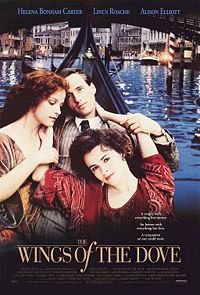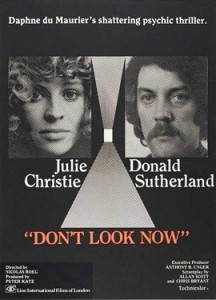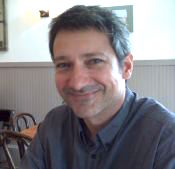Laszlo Fulop, an associate professor of documentary production, script analysis, video writing, and screenwriting at the University of New Orleans, has selected three films to be shown during the run of the exhibition A Life of Seduction: Venice in the 1700s. Though the movies are set in 20th-century Venice, many of the timeless themes and settings visible in the galleries are evident on the big screen. Arts Quarterly Editor David Johnson asked Professor Fulop what audiences can expect when the lights are dimmed and the projector rolls in Stern Auditorium for The Wings of the Dove (March 24), Death in Venice (April 21), and Don’t Look Now (May 19).
How did you come to choose the three films set in Venice? What research was involved?
I was looking for films where Venice, this wonder of an Italian city, plays a major role. That means that the majority of the film’s plot should be set in Venice. On a side note, Venice is one the few places on earth that looks better in person, when you are there, than in pictures. At the beginning of my research, I imagined that I would find dozens and dozens of films set in Venice, but that wasn’t so. I am sure that the logistics of shooting in Venice are very complex. After all, it’s a very dense, continuously crammed space, where tourists overrun every inch of its beautiful historical sites. Possibly, the permits needed to shoot in Venice are hard to obtain as well. It is much easier to find films shot in New Orleans than in Venice, and I realized that this is just the logical consequence of the local geopolitical and cultural situation. Still, there are some great films where Venice is present. One example is Fellini’s Casanova — that is the title, Fellini’s Casanova – Il Casanova di Federico Fellini — where there is a wonderful Carnival scene. But Casanova is arrested and, after his escape, he flees Venice, so the majority of the plot doesn’t deal with the city. Another film where Venice appears as an important “character” is David Lean’s Summertime, where Katharine Hepburn plays a tourist incessantly photographing the city. This is a great film, and there are a few others, but I had to pick only three and I finally decided on The Wings of the Dove, Death in Venice, and Don’t Look Now.
You mention the city as a character? Please explain.
In all three films Venice turns into a fairly dark, almost black-magical city, with a somewhat threatening atmosphere. This wasn’t an intentional choice. I just realize this now. Obviously, the long history and unparalleled richness of Venice has a certain weight that is apparent in almost any film set here.
Of the three films, Don’t Look Now has garnered the most controversy? What is it about this film that shocked audiences when it premiered in 1973?
Don’t Look Now is mix of a horror film, a drama, a thriller, and a travelogue. It deals with personal tragedy and death and what’s beyond both. It also has a sex scene, which I’ve heard was somewhat controversial back then. The reason may have to do with something more than the visuals and beautiful cinematography. This is an intimate moment between a husband and a wife who are grieving because of their young daughter’s tragic death. And Julie Christie’s character, the wife, has just come out of the hospital after a mental breakdown. Finally, the scene is intercut with the couple getting dressed to leave for an elegant dinner. So the pure joy of sensuality is mixed with a sense of grief, of tragedy, of illness, of madness. Additionally, the whole thing is presented in a very casual way as if the sex for this married couple was only as important as any other daily event, like getting dressed for dinner. We, the viewers, feel that we are voyeurs. We get a glimpse of an intimate moment in the life of the couple that we shouldn’t see. And we are overcome with a very complex mix of emotions because we identify with them and we feel their grief and their desperate attempt to get away from it all.
What particular moments in these films stand out to you?
In The Wings of the Dove, Helena Bonham Carter’s performance is spellbinding as it reflects moment by moment and thought by thought the drama unfolding in front of our eyes. She deservedly won many awards for this performance. In Death in Venice, the most interesting is the boy’s fascinating character and physicality, especially his face as viewed from the protagonist’s point of view, which becomes the point of view of the audience. These foil characters, the old composer and the young man — still a boy, actually — are cast very well by Luchino Visconti, the director. They stay with the viewer for a long time after the movie is over. Don’t Look Now manipulates time in a very exciting way. There is also the recurring visual motif of the color red, the mixture of emotions in the sex scene and elsewhere. All three movies are a great addition to NOMA’s exhibition on Venice.
ABOUT THE FILMS
Each movie screens at 7:30 p.m., preceded by a brief lecture by Professor Fulop. The movies are included in standard admission for Friday Nights at NOMA.
 MARCH 24 | The Wings of the Dove is a British-American romantic drama directed by Iain Softley and starring Helena Bonham Carter, Linus Roache, and Alison Elliott. The screenplay by Hossein Amini is based on the 1902 novel of the same name by Henry James. An impoverished woman who has been forced to choose between a privileged life with her wealthy aunt and her journalist lover, befriends an American heiress. When she discovers the heiress is attracted to her own lover and is dying, she sees a chance to have both the privileged life she cannot give up and the lover she cannot live without. The film was nominated for four Academy Awards and five BAFTAs, recognizing Bonham Carter’s performance, the screenplay, costume design, and the cinematography. Locations in Venice include St. Mark’s Square and the Palazzo Barbaro. (1997, Rated R, 1 hour 42 minutes) Watch the trailer.
MARCH 24 | The Wings of the Dove is a British-American romantic drama directed by Iain Softley and starring Helena Bonham Carter, Linus Roache, and Alison Elliott. The screenplay by Hossein Amini is based on the 1902 novel of the same name by Henry James. An impoverished woman who has been forced to choose between a privileged life with her wealthy aunt and her journalist lover, befriends an American heiress. When she discovers the heiress is attracted to her own lover and is dying, she sees a chance to have both the privileged life she cannot give up and the lover she cannot live without. The film was nominated for four Academy Awards and five BAFTAs, recognizing Bonham Carter’s performance, the screenplay, costume design, and the cinematography. Locations in Venice include St. Mark’s Square and the Palazzo Barbaro. (1997, Rated R, 1 hour 42 minutes) Watch the trailer.
 APRIL 21 | Death in Venice (1971), is an Italian-French drama film directed by Luchino Visconti and starring Dirk Bogarde and Björn Andrésen. It is based on the novella by the same name, first published in 1912 as Der Tod in Venedig by the German author Thomas Mann. Composer Gustave Aschenbach (Bogarde) travels to a Venice resort to escape personal and artistic stress. However, peace eludes him as he develops a disturbing attraction to an adolescent boy, Tadzio (Andresen). Their lives are both threatened with a sudden outbreak of cholera. (1971, Rated PG, 2 hours 10 minutes) Watch the trailer.
APRIL 21 | Death in Venice (1971), is an Italian-French drama film directed by Luchino Visconti and starring Dirk Bogarde and Björn Andrésen. It is based on the novella by the same name, first published in 1912 as Der Tod in Venedig by the German author Thomas Mann. Composer Gustave Aschenbach (Bogarde) travels to a Venice resort to escape personal and artistic stress. However, peace eludes him as he develops a disturbing attraction to an adolescent boy, Tadzio (Andresen). Their lives are both threatened with a sudden outbreak of cholera. (1971, Rated PG, 2 hours 10 minutes) Watch the trailer.
 MAY 19 | Don’t Look Now (1973) is an independent British-Italian thriller directed by Nicolas Roeg and adapted from a short story by Daphne du Maurier. Julie Christie and Donald Sutherland star as a married couple who travel to Venice following the recent accidental death of their daughter, after the husband accepts a commission to restore a church. They encounter two sisters, one of whom claims to be clairvoyant and informs them that their daughter is trying to contact them and warn them of danger. The husband at first dismisses their claims, but starts to experience mysterious sightings himself. Don’t Look Now is renowned for its innovative editing style, and its use of recurring motifs and themes. (1973, Rated R, 1 hour 50 minutes) Watch the trailer.
MAY 19 | Don’t Look Now (1973) is an independent British-Italian thriller directed by Nicolas Roeg and adapted from a short story by Daphne du Maurier. Julie Christie and Donald Sutherland star as a married couple who travel to Venice following the recent accidental death of their daughter, after the husband accepts a commission to restore a church. They encounter two sisters, one of whom claims to be clairvoyant and informs them that their daughter is trying to contact them and warn them of danger. The husband at first dismisses their claims, but starts to experience mysterious sightings himself. Don’t Look Now is renowned for its innovative editing style, and its use of recurring motifs and themes. (1973, Rated R, 1 hour 50 minutes) Watch the trailer.
